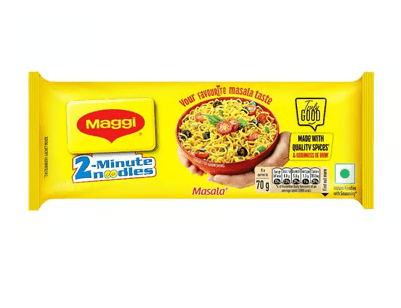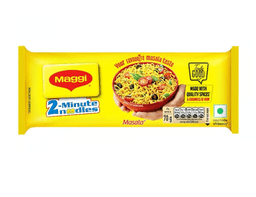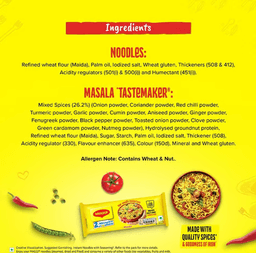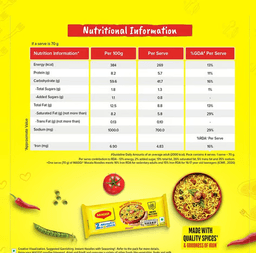Product Analysis Report
Comprehensive Safety Assessment




Potential Harmful Content:
Refined wheat flour (Maida)
Palm oil
Iodized salt
Wheat gluten
Thickeners (508 & 412)
Acidity regulators (501(i) & 500(i))
Humectant (451(i))
Sugar
Starch
Flavour enhancer (635)
Colour (150d)
Overview
This is an analysis of Maggi 2-Minute Noodles (Masala flavor). The noodles contain refined wheat flour (Maida), which is low in fiber and nutrients and can cause rapid blood sugar spikes. Palm oil is high in saturated fats, potentially raising cholesterol levels. Iodized salt is essential but excessive intake can lead to hypertension. Thickeners (508 & 412), Acidity regulators (501(i) & 500(i)), and Humectant (451(i)) are added for texture and preservation but offer no nutritional value. The 'Taste Maker' contains mixed spices and sugar, starch, palm oil, and flavor enhancers such as 635, which can cause adverse reactions in sensitive individuals. Colour 150d (caramel coloring) can contain potentially carcinogenic compounds. Overall, the product provides minimal nutritional benefits and contains ingredients that, when consumed regularly and in large quantities, may negatively impact health.
Trustworthiness
The product should be consumed in moderation due to the presence of refined ingredients, additives, and high sodium content. It is not a healthy staple food and should not be relied upon for nutritional needs. Further research into the long-term effects of consuming additives like flavor enhancers and specific thickeners is advisable for concerned consumers.
Misleading Information
The packaging highlights "quality spices" and "goodness of iron," which may be misleading as the product contains several unhealthy ingredients and processed components that offset the benefits of spices and iron. The term "2-Minute Noodles" implies a healthy and quick meal, which can be misleading given the ingredients.
Final Recommendation
This product is not a healthy choice due to refined ingredients and additives. Consume occasionally and in moderation. Individuals sensitive to additives should exercise caution.
Sources or Further Readings
1. Anderson, J. W., et al. 'Health implications of dietary fiber.' Nutrition Reviews 56.1 (1998): 1-18. 2. Willett, W. C. 'Dietary fat and coronary heart disease: a critical review.' The American Journal of Clinical Nutrition 34.11 (1981): 878-889. 3. EFSA Panel on Food Additives and Nutrient Sources added to Food (ANS). 'Scientific Opinion on the re-evaluation of caramel colours (E 150a, E 150b, E 150c, E 150d) as food additives.' EFSA Journal 9.3 (2011): 20. 4. https://www.fda.gov/ 5. https://www.who.int/